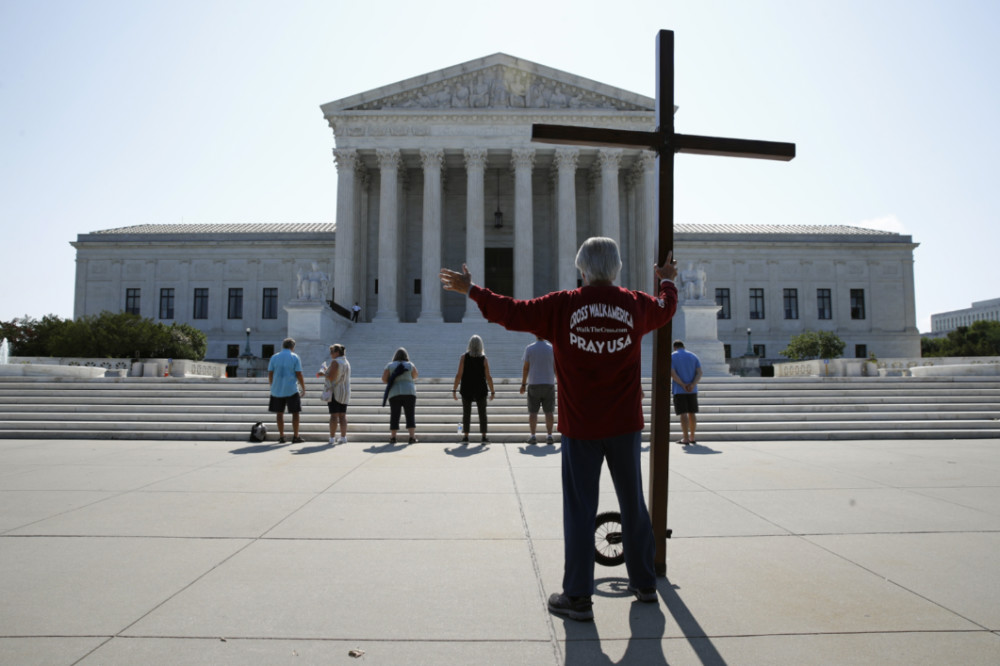The Supreme Court has ruled that religious school teachers who perform a religious role, even if they are not ordained, and even if religious instruction makes up a small part of their overall responsibilities, are subject to a ministerial exception from civil rights protections afforded to other employees.
The seven to-two ruling on Wednesday hands religious institutions a big win after a momentous defeat last month when the high court ruled that gay and transgender people are protected from workplace discrimination. Justices Ruth Bader Ginsburg and Sonia Sotomayor dissented.

Tom Alexander holds a cross as he prays prior to rulings outside the Supreme Court on Capitol Hill in Washington, Wednesday, 8th July. The Supreme Court is siding with two Catholic schools in a ruling that underscores that certain employees of religious schools, hospitals and social service centers can’t sue for employment discrimination. PICTURE: AP Photo/Patrick Semansky.
In Our Lady of Guadalupe School v Morrissey-Berru and St James School v Biel, the court carved out a broad ministerial exception to workplace discrimination rules that allows religious schools to include lay teachers as among those subject to an exemption from civil rights laws, such as Title VII of the 1964 Civil Rights Act.
“The religious education and formation of students is the very reason for the existence of most private religious schools, and therefore the selection and supervision of the teachers upon whom the schools rely to do this work lie at the core of their mission,” wrote Justice Samuel Alito, who authored the ruling. “Judicial review of the way in which religious schools discharge those responsibilities would undermine the independence of religious institutions in a way that the First Amendment does not tolerate.”
The ministerial exception is a legal doctrine arising from the First Amendment that bars the government from interfering with religious institutions’ hiring and firing of clergy.
The idea is that the government should not impose on religious institutions in matters of faith and doctrine.
In the combined cases, two Catholic school teachers who taught fifth grade found their contracts were not renewed. They sued, claiming discrimination. Agnes Morrissey-Berru, who was forced to retire, sued on the basis of age. Kristen Biel, who asked for time off because she was receiving treatment for breast cancer, sued on the basis of disability. She has since died.
Neither school required its teachers to be practicing Catholics, and Morrissey-Berru was not. But both teachers performed some religious functions, teaching a module on religion and leading the students in prayer.
The court found that that was sufficient and that the teachers were not entitled to discrimination protections.
“There is abundant record evidence that they both performed vital religious duties, such as educating their students in the Catholic faith and guiding their students to live their lives in accordance with that faith,” Alito said.
Wednesday’s ruling offered an added boost to religious schools. Last week, the high court said state programs that provide scholarships to students in private schools may not exclude religious schools.
The idea of a ministerial exception has been around for a long time. Through the years, courts have recognized that secular justices should not adjudicate internal affairs of a church or synagogue. For example, courts can’t tell the Catholic Church to hire a woman as a priest when the church maintains an all-male priesthood.
But the court expanded on the ministerial exception in a 2012 case – Hosanna-Tabor Evangelical Lutheran Church and School v EEOC – when it ruled that a kindergarten teacher could not sue the Lutheran school she worked for, because she had some religious responsibilities. In that case, the teacher, Cheryl Perich, had been designated a “called teacher” after completing a theological course of study. The Lutheran Church-Missouri Synod referred to her as a “commissioned minister.”
When Petrich became sick and had to take time off, the school replaced her and she sued under the Americans with Disabilities Act.
But in that case the court did not spell out a formula to determine whether all school teachers qualify as ministers.
Critics, including the National Women’s Law Center and the Leadership Conference on Civil and Human Rights, said Wednesday’s ruling would drastically increase the number of employees denied civil rights protections.
It would potentially deprive scores of women, people of color, older workers, workers with disabilities, LGBTQ employees and others of legal remedies for workplace discrimination.
Those teachers would not be able to sue over sexual harassment or for overtime pay, equal pay and a myriad of other civil rights protections.
Caroline Mala Corbin, a professor of law at the University of Miami School of Law, said the ruling would most affect women, who make up the majority of religious school teachers.
“Women are not ministers when it comes to the actual title, but suddenly they are ministers when it comes to losing their protections from discrimination,” Corbin said. “They get the worst of both.”
At the root of the case was the question: What is an “important religious function”?
The schools argued the sole test for eligibility for the ministerial exception is whether the employee fulfills an important religious function, regardless of whether the employee has religious training or a formal title such as “minister.”
Several lawyers wrote an amicus brief agreeing.
“In the long run, nothing is more important to religious organisations than transmitting the faith to the next generation,” said Douglas Laycock, a leading scholar in the area of religious liberty who argued the Hosanna-Tabor case before the court eight years ago. “Churches have to keep control of that process.”
The US Conference of Catholic Bishops and the Ethics & Religious Liberty Commission of the Southern Baptist Convention both cheered the ruling.
“If a religious organization cannot recruit leaders who agree with the beliefs and practices of those organizations, then there can be no true religious freedom,” wrote Russell Moore, president of the ERLC.
The schools were represented by the Becket Fund for Religious Liberty.





